Surely, you’ve heard of Testosterone, haven’t you? It’s not just a determinant of muscular strength or masculinity, but Testosterone also plays a crucial role in our overall health and mental well-being. But what happens when the levels of this hormone start to decline? Let’s explore with Grove Health Bondi and gain a deeper understanding of Testosterone Decline, its impact on the body, and the actions you can take to improve your health.
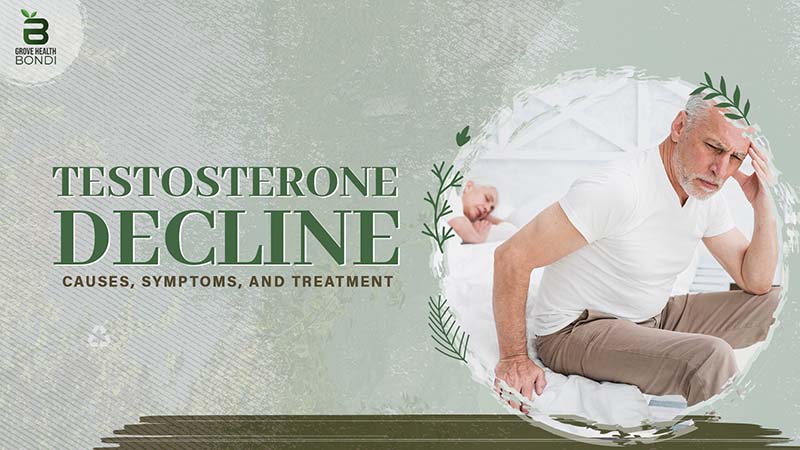
1. What is Testosterone Decline?
Testosterone deficiency, also known as male hypogonadism, is a condition where the concentration of testosterone in the blood falls below the average range of 10-35 nanomoles per liter in adults. According to the American Urological Association (AUA), about 20% of men over 60 and 30% of men between 70-80 years old have low testosterone levels.
Testosterone, a crucial sex hormone, is primarily produced in the Leydig cells in the testes and a small portion from the adrenal glands, starting from the seventh week of gestation. Testosterone levels surge during puberty and peak in the 20-30 age range. However, after the age of 30, the amount of testosterone in the male body begins to gradually decrease, becoming more evident around the age of 40.
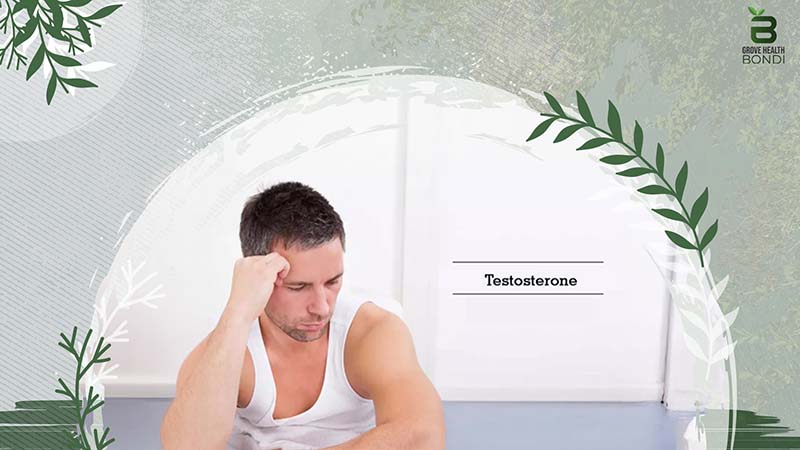
2. Age-Related Testosterone Decline in Males
As time progresses, our body’s organs gradually weaken, leading to an inability to produce sufficient amounts of Testosterone necessary for the body’s normal functioning. According to estimates, the amount of Testosterone in the body decreases by 1-2% each year, and only about 70% remains when men reach the age of 50, dropping to 50% by the age of 70. This means that the rate of Testosterone decline accelerates as we age.
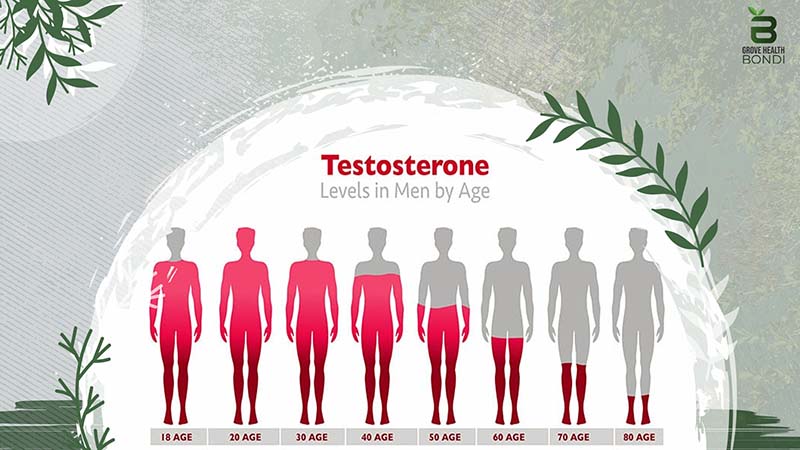
3. Causes Of Low Testosterone Levels In Men
In addition to aging, where natural testosterone levels start to decline after the age of 30, there are several other factors that contribute to a decrease in testosterone levels in the body:
- Stress and Fatigue: Mental stress, pressure, and lack of sleep can rapidly decrease testosterone levels. When the body is under stress, it releases hormones such as cortisol and adrenaline for self-protection. However, these hormones inhibit the production of testosterone. This explains why men often experience a decrease in sexual desire when stressed. One study even showed that individuals who sleep only about 5 hours each night over a week have testosterone levels equivalent to someone 15 years older.
- Sexual Abuse: Excessive sexual intercourse or masturbation can lead to a decrease in testosterone. It not only causes infectious diseases of the genital organs such as prostatitis and orchitis, but also increases pressure on the nervous system, causing the genital organs to operate continuously and ejaculate continuously, leading to a decrease in the amount of testosterone in the body.
- Exposure to Toxic Chemicals, Polluted Environment: Toxic chemicals such as dust, pesticides, smoking… not only negatively affect overall health but also affect men’s sexual health. Specifically, nicotine and toxic components in cigarettes can cause sclerosis, aging of the arteries, obstruct blood flow to the penis, and cause erectile dysfunction, premature ejaculation.
- Side Effects of Drugs: Some types of treatment drugs can cause testosterone decline such as sedatives, sleeping pills, drugs for treating stomach ulcers, joints, prostate cancer…
- Having Certain Diseases: Overweight, obesity, high blood pressure, diabetes, muscle tendons, chronic kidney failure, severe primary hypothyroidism, HIV… can all reduce testosterone in the body to a low level.
- Unreasonable Lifestyle, Diet, Exercise also affect the process of producing male hormones, leading to low testosterone, below normal levels, causing many serious symptoms for the body.
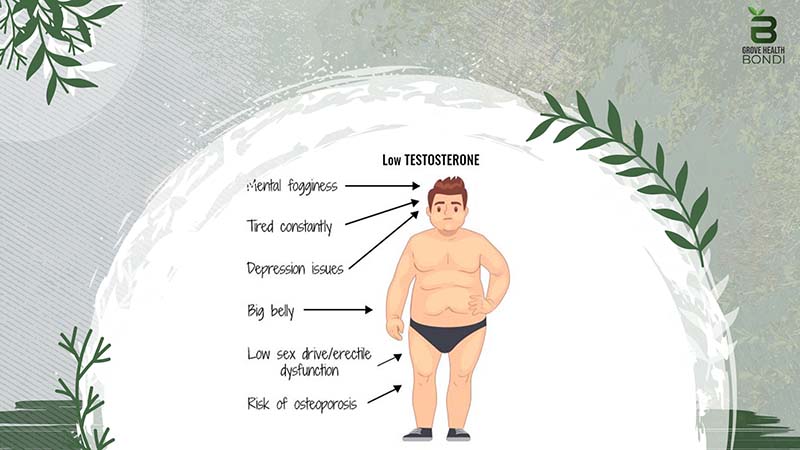
4. Identifying Signs of Low Testosterone
If testosterone production significantly decreases, a series of symptoms may appear. Here are the signs indicating that testosterone levels are declining, something every gentleman should be aware of.
4.1. Reduced Sexual Desire
Testosterone, a key hormone in maintaining the sexual function of men, plays a crucial role in creating sexual desire, regulating the erection process, and controlling the production and nourishment of sperm. Therefore, when the level of this hormone decreases, men may experience a decline in sexual desire, becoming “less interested”, thinking less about sex, and even avoiding intimacy.

4.2. Difficulty in Achieving Erection
Testosterone, a crucial hormone in men, not only plays a role in generating sexual desire but also supports the erection process. Although testosterone does not directly cause an erection, it stimulates the brain to produce Nitric Oxide – a molecule that helps the muscles in the blood vessel walls relax, facilitating the erection process. When testosterone levels decrease, men may struggle to achieve and maintain an erection.
However, testosterone is just one of many factors contributing to the erection process. Currently, no studies have definitively determined the role of testosterone in treating erectile dysfunction. In fact, erectile dysfunction could be a sign of declining testosterone levels, but it could also signal various other diseases such as diabetes, high blood pressure, lipid disorders, high cholesterol, thyroid-related issues, and psychological problems like stress and depression.
4.3. Low Semen Volume
Testosterone, a vital hormone in men, plays a significant role in the production and determination of the quality and quantity of sperm. It also influences the shape and mobility of the sperm. When testosterone levels decrease, men often notice a reduction in the volume of semen during ejaculation. This can lead to a decrease in the quality and quantity of sperm, thereby affecting reproductive ability and potentially leading to infertility or subfertility.
4.4. Hair Loss
Testosterone, an essential hormone in men, plays a role in many bodily functions, including influencing the hair system to promote robust growth of body and facial hair. Baldness can be a part of the natural aging process for many men. Although there is a genetic factor related to baldness, men with low testosterone levels may also face the condition of losing body and facial hair.
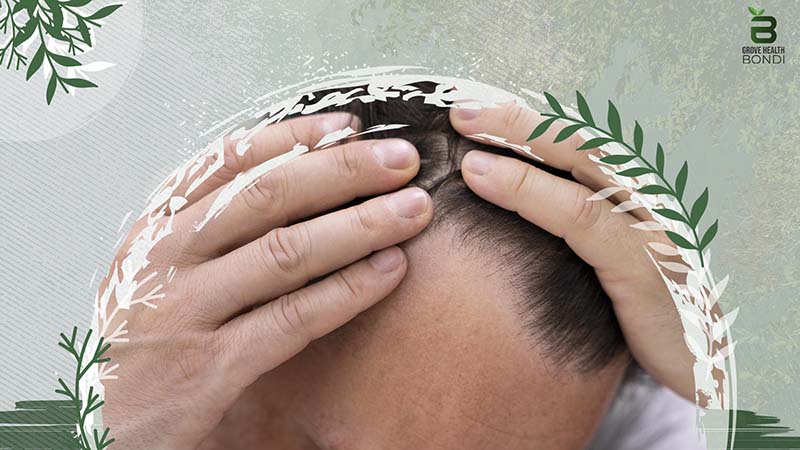
4.5. Fatigue
When testosterone levels decrease, men may feel tired, lack energy, and no longer have the vigor and vitality they once had. They may constantly feel fatigued and listless, even when they have had enough sleep, and may even lose the desire to be active. These are common manifestations of decreased testosterone in men.
4.6. Loss of Muscle Mass
Testosterone, a vital hormone in men, plays a central role in muscle development. When testosterone levels decrease, men may notice a reduction in their muscle mass. Studies have shown that testosterone impacts muscle mass by enlarging muscle fibers and maintaining their strength. Additionally, this hormone helps enhance the connection between bones and periosteum, supporting the simultaneous development of bone size and length. Testosterone also contributes to the development of bone structure by enhancing the process of calcium absorption. Therefore, when testosterone levels decrease, muscle mass may become loose and less firm.
4.7. Increased Body Fat
When testosterone levels in the male body decrease, muscle mass gradually diminishes and is replaced by excess fat. Testosterone is the hormone that counteracts the development of fat cells produced by Leptin, helping to keep the amount of fat in the body and abdominal area low. When testosterone levels decrease, the male body begins to lose balance, with the abdomen containing more fat, enlarged breasts or gynecomastia. This could be due to an imbalance between testosterone and estrogen in the male body.
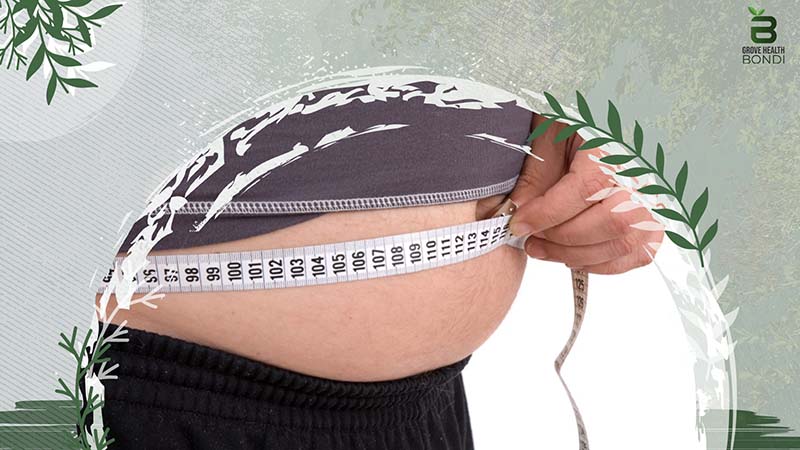
4.8. Decreased Bone Mass
Osteoporosis, also known as bone mass reduction, is commonly known to be a prevalent condition in women. However, men with decreased male hormone levels can also face this condition. Testosterone plays a crucial role in creating and enhancing bone strength. Therefore, men, especially the elderly, with low testosterone levels will experience a decrease in bone density, leading to a higher risk of fractures.
4.9. Mood Changes
Men with decreased levels of the male hormone, testosterone, may experience mood changes. This hormone is responsible for regulating the nervous system and psychology, thereby affecting mood and cognitive abilities. Studies have shown that men with low testosterone levels tend to suffer from psychological issues such as depression, irritability, or difficulty concentrating. Simultaneously, other health problems such as anemia, sleep disorders, and depression may also occur.
4.10. Memory Problems
Over time, both testosterone and cognitive abilities, particularly memory, tend to decline in men. A study at Monash University in Australia has shown that testosterone plays a role in protecting nerve cells and enhancing oxygen supply to the brain. However, as age increases, the level of testosterone in the brain gradually decreases, which is believed to be the cause of memory decline.
4.11. Reduced Testicle Size
Low levels of testosterone in the male body could be a reason for the testicles being smaller than normal. This hormone is essential for the development of the genital organs, including the penis and testicles. When testosterone levels are low, the penis or testicles may become smaller and even disproportionate. However, it’s important to note that small testicles could be due to various other causes.
4.12. Anemia
Testosterone plays a pivotal role in stimulating bone marrow to produce blood, thereby increasing the count of red and white blood cells. According to a study published in the Journal of the American Medical Association, physicians have discovered a correlation between low testosterone levels and the risk of anemia. Researchers applied testosterone gel to men with anemia who had low testosterone levels and observed an improvement in their blood formula compared to the group using a placebo gel. Some symptoms of anemia may include difficulty concentrating, muscle cramps, insomnia, dizziness, and irregular rapid heartbeat.
Additionally, low testosterone levels can also lead to other health issues such as cardiovascular diseases, diabetes, obesity, and thyroid-related conditions.
5. How is Low Testosterone Diagnosed?
To determine low testosterone levels, physicians rely not only on physical evaluations and the symptoms that patients are experiencing, but they may also request a blood test to measure testosterone levels.
Testosterone tests are conducted similarly to regular blood tests and are typically performed in the morning when this hormone’s concentration peaks. Before conducting the test, doctors will ask patients to temporarily stop using any medications that could affect the hormone levels in the blood.
The results of the testosterone test will indicate the concentration of testosterone in the blood. If testosterone is within the range of 10 to 35 nanomoles per liter, this is considered a normal, healthy level. If the index is lower than this threshold, men’s health, sexual function, and reproductive ability may be affected, leading to symptoms such as fatigue, decreased sexual desire, erectile difficulties, or infertility.
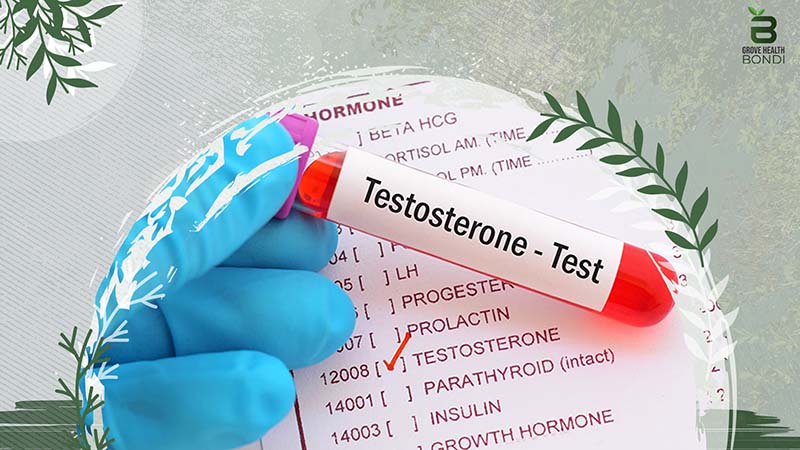
6. Treatment Methods for Low Testosterone
Low testosterone levels can have numerous negative impacts on a man’s life. Therefore, upon detecting signs of testosterone decline, men should seek medical attention from reputable healthcare facilities or hospitals for timely examination and intervention. Doctors will base their treatment methods on each individual’s specific condition. Typically, the treatment for low testosterone conditions will include the following main methods:
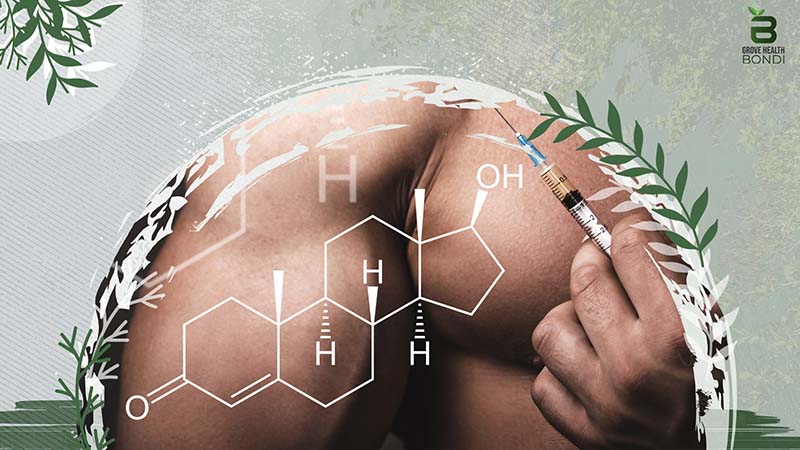
6.1. Testosterone Replacement Therapy
Testosterone replacement therapy is a solution applied to men experiencing symptoms of testosterone decline that negatively affect their lives. There are several ways to implement this therapy, including: injections into the arm (every 10-14 days); using testosterone patches (placed on body parts such as the abdomen, buttocks, back, arms); applying daily testosterone gel to clean, dry skin areas on the back, arms; implanting testosterone pellets under the arm every two months, or taking testosterone pills.
Most people will see a reduction in symptoms within 4-6 weeks after starting this therapy. However, this therapy also carries many risks such as: increased risk of sleep apnea, stimulation of the growth of potential prostate cancer cells, breast enlargement, increased risk of deep vein thrombosis, pulmonary embolism, restricted sperm production, and testicular shrinkage. Especially, testosterone therapy has a high risk of causing cardiovascular diseases. Therefore, when choosing this therapy, men need to discuss thoroughly with their doctors about the potential benefits and risks to make an appropriate decision.
6.2. Use of Dietary Supplements
Nowadays, there are many products on the market advertised as solutions to support and improve men’s sexual health. However, when choosing to use these products, men need to pay attention to some important factors. First, consider the origin of the product, ensuring that it comes from a reputable manufacturer. Second, check the ingredients of the product, its mechanism of action, and proven effectiveness. Finally, ensure that the product has been licensed for circulation by the competent authority. These factors will help ensure the safety and effectiveness of the product for men’s health.
6.3 Natural Ways to Boost Testosterone
Boosting testosterone is not only achieved through medication treatments or the use of natural products, but can also be accomplished through lifestyle and dietary changes. Here are some natural ways to boost testosterone:
- Regular physical exercise: Dedicate 30-60 minutes each day to physical training, maintaining at least 5 sessions per week.
- Positive lifestyle changes: Adjust your work and rest schedules, limit and manage stress, avoid staying up late, and reduce alcohol and tobacco consumption.
- Balanced and nutritious diet: Enhance your diet with foods beneficial for men’s health such as seafood, beef, eggs, milk, cereals, and various types of nuts.
6.4. Exercises to Enhance Testosterone
Regular physical exercise not only improves health, enhances flexibility and agility for the musculoskeletal system, stimulates blood circulation, and creates a toned physique, but it is also an effective method to improve male hormone levels. Here are some exercises to boost testosterone:
- Swimming: A comprehensive exercise that enhances overall health.
- Speed walking: An excellent method to enhance cardiovascular health and improve endurance.
- Yoga: Helps improve flexibility, reduce stress, and enhance overall health.
- Kegel exercises: These exercises help improve the fundamental health of the reproductive system.
- Weightlifting: Helps enhance strength and stimulate muscle growth.
- Squats: A comprehensive exercise that enhances the strength and flexibility of leg muscles.

7. Preventing Testosterone Decline
The hormone testosterone plays a crucial role in men’s health, so preventing testosterone decline from an early stage is essential. Here are some measures that can be implemented:
Stress reduction and control: Stress is considered the main cause of male hormone decline. Measures to reduce stress can include:
- Organizing work reasonably: Avoid taking on too many tasks at once.
- Relaxation: Spend time listening to music, reading books, meditating, or chatting with friends and family.
- Deep breathing exercises: Helps to relieve nervous tension.
- Exercise: A good way to improve health and uplift spirits.
- Relax with hobbies: Such as bird watching, pruning ornamental plants…
- Avoid staying up late, get enough sleep: Ensure to sleep for 7-8 hours each day.
8. Conclusion
Testosterone decline is not just a personal issue, but it also affects the happiness and quality of life of men. Manifested through symptoms such as fatigue, decreased desire, and even affecting reproductive ability, testosterone decline needs attention and timely treatment. Seeking medical intervention from reputable specialty centers is an important step to ensure robust health and proactivity in life. This article hopes to have provided a comprehensive and insightful view of this issue, contributing to your daily health care journey.

